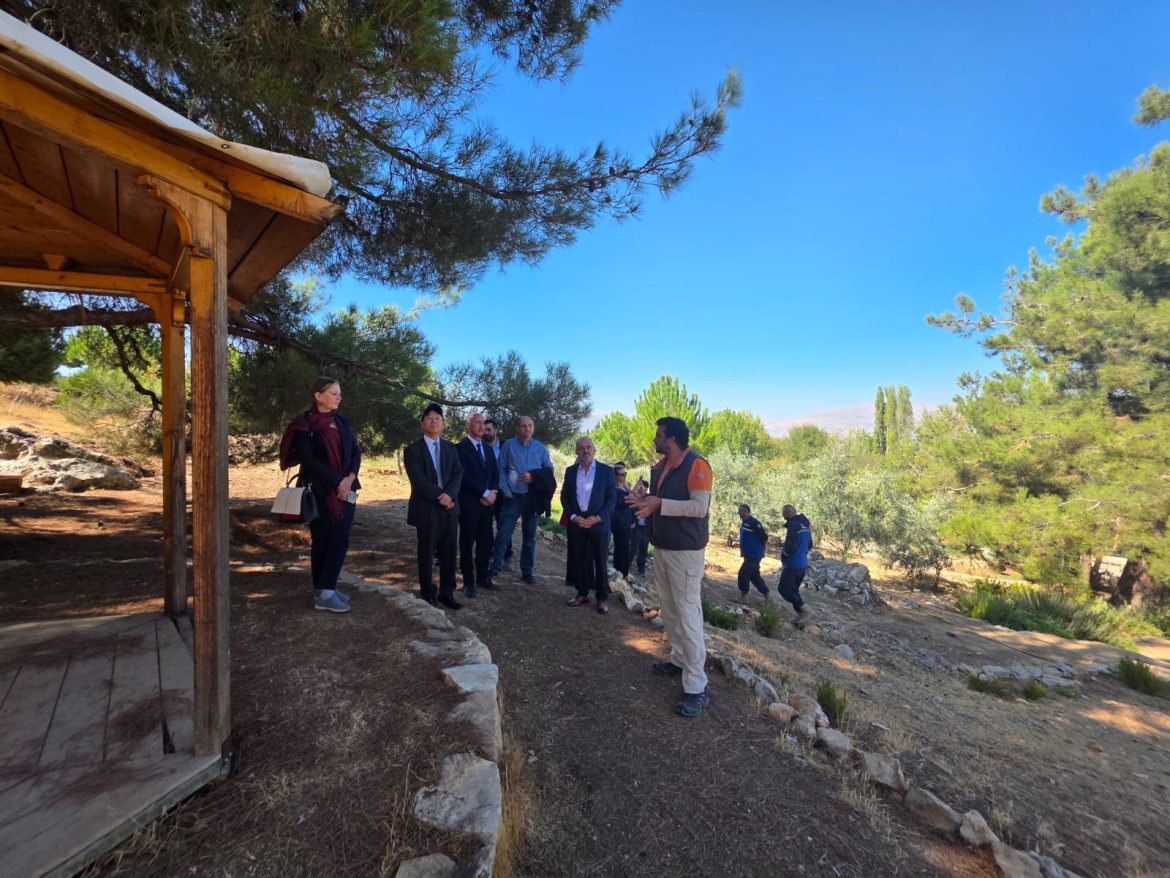Anjar, Lebanon – 14 October 2025 – The Food and Agriculture Organization of the United Nations (FAO), in partnership with the Ministry of Agriculture, and the Municipality of Anjar, and with the generous funding of the Government of the Republic of Korea, marked the successful completion of the project “Enhancing the Resilience of Refugees and Host Communities” with a field visit to Anjar, in the Bekaa region.
Implemented by FAO and the Ministry of Agriculture, the project aimed to improve livelihoods, promote environmental sustainability, and enhance local disaster preparedness.
The field visit was attended by H.E. Gyusuk Geon, Ambassador of the Republic of Korea to Lebanon; Mrs. Nora Ourabah Haddad, FAO Representative in Lebanon; Mr. Setrag Havatian, Mayor of Anjar, and Khalil Akl, Head of the Service of Agriculture in the Bekaa Region representing the Ministry of Agriculture, Michel Bassil, Head of the Service of Reforestation and Harvesting at the Ministry of Agriculture; and representatives from FAO, the Embassy of the Republic of Korea and the municipality of Anjar. The delegation witnessed firsthand the project’s positive impact on local communities and the support provided to the Municipality of Anjar.
During the visit, the delegation inspected the Multi-Hazard Response Unit, a municipal truck equipped with tools for both flood and fire emergencies, and toured the solar-powered water pumping system, which includes an electrical control room and water pump established with funds from the Government of the Republic of Korea. The project also provided Anjar Municipality with essential tools and awareness programmes to prevent wildfires and mitigate flood risks, further strengthening the community’s resilience to environmental challenges.
Ambassador Gyusuk Geon said: “Korea has always believed that the most enduring form of assistance is one that empowers people, helping communities stand on their own, protect their environment and restore hope for a better future.I am particularly encouraged by the way this initiative brought together refugees and host communities’ members, not as two separate groups, but as partners in rebuilding and protecting their shared environment. That is the essence of inclusive development and peacebuilding.”
“This project exemplifies how international cooperation, and strong local engagement can lead to tangible improvements in the lives of vulnerable communities,” said Nora Ourabah Haddad, FAO Representative in Lebanon. “Through targeted employment, training, and environmental initiatives, we have strengthened both livelihoods and resilience in Anjar.”
Khalil Akl, Head of the Service of Agriculture in the Bekaa Region representing the Ministry of Agriculture, stated that this project represents a model for future collaboration, one that combines resilience, sustainability, and community empowerment. He affirmed the Ministry’s commitment to building on this experience to enhance rural development and natural resource management across Lebanon.
Mr. Setrak Havatian, Mayor of Anjar, welcomed the delegation and thanked the Ambassador, the FAO Representative in Lebanon, and the representative of the Ministry of Agriculture for their continuous support and dedication to the success of this project in Anjar.
A central component of the initiative was a Cash-for-Work programme, which provided temporary employment to 300 refugees and host community members. Prior to beginning their work, participants received specialized training in landscape restoration, afforestation, and land maintenance. Their activities included creating firebreaks, maintaining new plantations, implementing agroforestry and climate-smart agricultural practices, and reducing fuel loads around refugee settlements, agricultural lands, and forested areas.
In addition, the project delivered targeted training sessions on Climate-Smart Agriculture, Natural Hazard Prevention and Management, and Grassroots Cooperatives Development, equipping communities with sustainable skills and practices to strengthen resilience in the long term.

